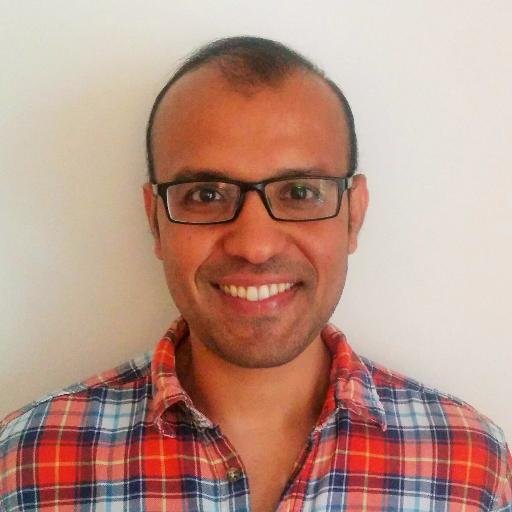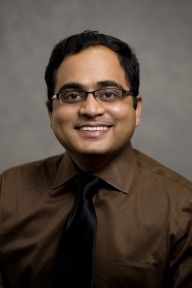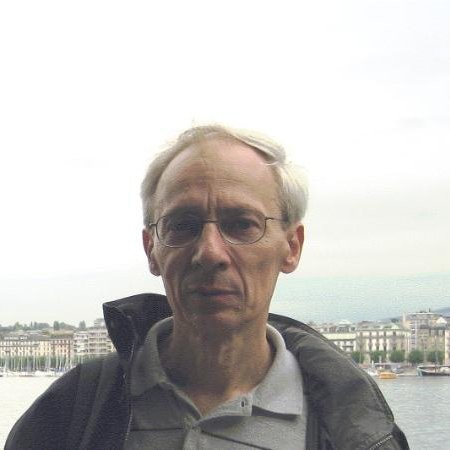|
|
Spring 2019: Upcoming Seminars
|
|
MOSFET degradation due to Hot Carrier Injection in finFETs: statistical variations and the effect of self-heating
Speaker:
Dr. Keith Jenkins
Date:
Friday, Apr. 12th, 2pm, CEPSR 414
|
|
|
|

Prof. Siddharth Garg
New York University
Date:
Friday, Mar. 8th, 2:00pm-3:00pm,
Location:
CEPSR 414
|
Building Trustworthy Computing Systems: From Hardware to Machine Learning
Abstract:
How can users trust that their everyday computing platforms, CPUs, GPUs and ASICs, are performing computations privately and correctly? Users have good reason to skeptical of the trustworthiness of existing computing systems. For one, most computing hardware is increasingly manufactured off-shore at one of only a few advanced semiconductor foundries. Malicious foundries might pirate and black-market a chip, or potentially even modify its functionality (i.e., insert a hardware Trojan). The first part of this talk will cover my work on how chips can be securely fabricated at untrusted off-shore foundries; the hope is to reap the benefits of advanced manufacturing technology (which might only be available off-shore) without compromising trust.
Another reason for skepticism is the move towards edge and cloud computing. Increasingly, expensive computations are outsourced to (a potentially untrusted) cloud, and particularly so with modern machine learning computations that rely on deep learning. The second part of this talk will cover my work on how outsourced training of deep neural networks introduces new security vulnerabilities, particularly the threat of a backdoored neural network (or BadNets), and how these vulnerabilities can be mitigated. I will conclude by highlighting on-going work in my lab on designing robust and secure deep learning accelerators.
Biography:
Siddharth Garg is an Assistant Professor at New York University in the ECE department. His general research interests are in computer engineering, and more particularly in secure, reliable and energy-efficient computing. For his work, Siddharth has received the NSF CAREER Award (2015), a "Top Picks in Hardware Security" for his NDSS'15 paper, and best paper awards at the IEEE Symposium on Security and Privacy (S&P) 2016, USENIX Security Symposium 2013, NIPS Machine Learning Security Workshop (2017) and the International Symposium on Quality in Electronic Design (ISQED) in 2009. Siddharth also received the Angel G. Jordan Award from ECE department of Carnegie Mellon University for outstanding thesis contributions and service to the community.
He serves on the technical program committee of several top conferences in the area of computer engineering and computer hardware, and has served as a reviewer for several IEEE and ACM journals. He received his Ph.D. degree in Electrical and Computer Engineering from Carnegie Mellon University in 2009, an M.S. from Stanford in 2005 and a B.Tech. degree in Electrical Engineering from the Indian Institute of Technology Madras.
|
|

Prof. Sameer Sonkusale
Tufts University
Date:
Friday, Mar. 29th, 2:00pm-3:00pm
Location:
CEPSR 750
|
Hanging by a thread: sensors, microfluidics, electronics and drug delivery
Abstract:
This talk will explore the new realm of using threads as an ultimate platform for flexible and stretchable bioelectronics. Threads offer unique advantages of universal availability, low cost, material diversity and simple textile-based processing.
In this talk, I will report reel-to-reel fabrication to make functional smart threads for variety of sensing and electronics application. For example I will report on nanomaterial-infused smart threads for strain and temperature sensing.
Threads will be presented for sensing pH, glucose, and other chemical biomarkers. Interestingly, threads also provide an ideal platform for passive microfluidic sampling and delivery of analytes.
I will show our recent work on using this toolkit of thread-based microfluidics, sensors and electronics for application as surgical sutures and flexible smart bandages for chronic wounds. Our recent work on using threads for closed loop spatiotemporal dosage controlled drug delivery will also be presented.
If there is time, I will present some research activities on chemical sensor array aka artificial nose, and on CMOS image sensors to support such sensing functions.
Biography:
Sameer Sonkusale is currently a Professor of Electrical and Computer Engineering at Tufts University with a joint appointment in the department of Biomedical Engineering.
He is currently on sabbatical at the Wyss Institute at Harvard University and at Brigham and Women's Hospital of Harvard Medical School.
At Tufts University, Dr. Sonkusale directs an interdisciplinary research group Nano Lab with research focus on micro- and nano- fabrication, nanoscale sensors, biomedical microdevices, circuits and systems.
Prior to coming to Tufts, he was an Assistant Professor at Texas A&M University from 2002 to 2004 and also held the position of visiting associate professor of medicine at Harvard Medical School and Brigham and Women's Hospital for 2011-2012.
Dr. Sonkusale received his MS and PhD in Electrical Engineering from the University of Pennsylvania. He has received several awards including the National Science Foundation CAREER award in 2010.
He is an alumnus of the National Academy of Engineering US Frontiers of Engineering meeting in 2015, and the National Academy of Sciences Arab-America Frontiers meeting in 2014 and 2016.
Dr. Sonkusale is on the editorial boards of Nature Scientific Reports, IEEE Transactions on Biomedical Circuits and Systems, Journal of Low Power Electronics and Application, and Electronic Letters. He is a senior member of the IEEE, and a member of OSA, MRS, BMES and AAAS.
|
|

Dr. Keith Jenkins
Formerly IBM
Date:
Friday, Apr. 12th 2:00pm-3:00pm
Location:
CEPSR 414
|
MOSFET degradation due to Hot Carrier Injection in finFETs: statistical variations and the effect of self-heating
Abstract:
MOSFET degradation due to Hot Carrier Injection in finFETs: statistical variations and the effect of self-heating
Device degradation, or aging, is a continuing concern for CMOS circuits, and estimating product lifetime
demands a proper assessment of such degradation. Of the known degradation mechanisms, that due to
channel hot carrier injection (HCI) is taking an increasingly prominent role in contemporary CMOS
technologies. The seminar presents experiment studies of HCI degradation in modern finFETs, particular
in regard to the effect of self-heating, which can impact lifetime projection, and on the change of the
statistical distribution of FET parameters as they degrade, which can affect the design margins assumed
by circuit designers.
Biography:
Keith Jenkins was a Research Staff Member at the IBM Thomas J. Watson Research Center from
1983 to 2018. In this position, he did research in a variety of device and circuit subjects,
including high frequency measurement techniques, electron beam circuit testing, radiation-
device interactions, low temperature electronics, SOI technology, and substrate crosstalk in
circuits. His most recent activities include designing circuits for analog on-chip self-
measurement, evaluating the frequency response of nanoscale devices, studying the impact of
self-heating in advanced CMOS technologies, and designing compact and efficient structures to
measure circuit and device reliability. He has a PhD in physics from Columbia University, for
experimental work in high energy physics.
|
|

Dr. Ahmed M. A. Ali
Analog Devices Fellow
Date:
Friday, Apr. 19th, 2:00pm-3:00pm
Location:
CEPSR 414
|
[SSCS Distinguished Lecture] Digitally-Assisted Data Converters
Abstract:
Data converters are the interface between the real analog world and the digital realm. They are so ubiquitous that on any given day every person in the developed world will likely utilize a data converter in one form or another. The insatiable need for higher resolution A/D converters (ADCs) at higher sample rates has made digital assistance a necessity. In this talk, we will discuss some of the common architectures and advanced calibration techniques for high-speed and high-resolution ADCs. These include techniques to correct for non-linearity, settling, kick-back, and memory errors.
The talk will discuss the advantages and limitations of the different approaches, practical considerations and some state-of-the-art examples.
Biography:
Ahmed M. A. Ali received the B.Sc. and M.Sc. degrees, with distinction and highest honor in electrical engineering from Ain Shams University, Cairo, Egypt, and the Ph.D. degree in electrical engineering from the University of Pennsylvania, Philadelphia.
He is currently a Fellow at Analog Devices, where he has led the design and development of several industry and world firsts in the high-speed data converter field. His past industrial experience include Texas Instruments, Anacad/Mentor Graphics, and Siemens AG.
He was an Adjunct Assistant Professor at the University of Pennsylvania from 2001 to 2007 and is an IEEE SSCS Distinguished Lecturer. He currently serves on the ISSCC Data Converter sub-committee and as an Associate Editor of the IEEE Transactions on Circuits and Systems I: Regular Papers.
He is the author of the book: "High Speed Data Converters", published by the Institution of Engineering & Technology (IET) in 2016. He is the principal author of more than 30 papers and holds 50 patents. His research interests include analog IC design, high linearity sampling, digitally assisted converters, and signal processing.
Dr. Ali received the S.J. Stein award from the University of Pennsylvania. He is also the recipient of the George Stephenson Foundation award, the Catalyst Foundation fellowship award, the University of Pennsylvania fellowship, and several industry and academic excellence awards.
|
|
Spring 2019 Seminars
|
|
Title:
Building Trustworthy Computing Systems: From Hardware to Machine Learning
Speaker:
Prof. Siddharth Garg
Date:
Friday, March 8th, 2pm, CEPSR 414
Title:
Hanging by a thread: sensors, microfluidics, electronics and drug delivery
Speaker:
Prof. Sameer Sonkusale
Date:
Friday, Mar. 29th, 2pm, CEPSR 750
Title:
MOSFET degradation due to Hot Carrier Injection in finFETs: statistical variations and the effect of self-heating
Speaker:
Dr. Keith Jenkins
Date:
Friday, Apr. 12th , 2pm, CESPR 414
Title:
[SSCS Distinguished Lecture] Digitally-Assisted Data Converters
Speaker:
Dr. Ahmed M. A. Ali
Date:
Friday, Apr. 19th, 2pm, CEPSR 414
|
|
|
|
|

